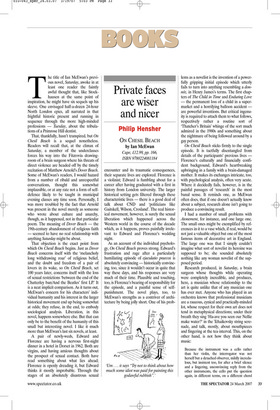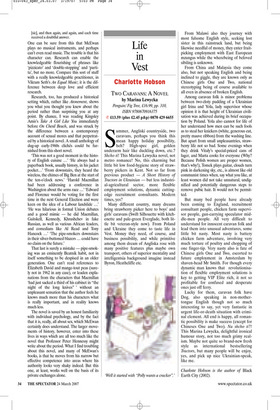Private faces are wiser and nicer
Philip Hensher
ON CHESIL BEACH by Ian McEwan Cape, £12.99, pp. 166, ISBN 9780224081184 The title of Ian McEwan’s previous novel, Saturday, awoke in at least one reader the faintly awful thought that, like Stockhausen at the same point of inspiration, he might have six sequels up his sleeve. One envisaged half-a-dozen 24-hour North London epics, all narrated in that frightful historic present and running in sequence through the more high-minded professions — Tuesday, about the tribulations of a Primrose Hill dentist.
That, thankfully, hasn’t transpired, but On Chesil Beach is a sequel nonetheless. Readers will recall that, at the climax of Saturday, a member of the underclasses forces his way into the Fitzrovia drawingroom of a brain surgeon where his threats of direct violence are headed off by the timely recitation of Matthew Arnold’s Dover Beach. Some of McEwan’s readers, I would hazard from a number of ribald and unrespectful conversations, thought this somewhat implausible, or at any rate not a form of selfdefence likely to be taught in municipal evening classes any time soon. Personally, I was more troubled by the fact that Arnold was present in the novel merely as someone who wrote about culture and anarchy, though, as it happened, not in that particular poem. The meaning of Dover Beach — the 19th-century abandonment of religious faith — seemed to have no real relationship with anything Saturday might be about.
That objection is the exact point from which On Chesil Beach begins. Just as Dover Beach concerns itself with the ‘melancholy long withdrawing roar’ of religious belief, and the doubt and freedom of a pair of lovers in its wake, so On Chesil Beach, set 100 years later, concerns itself with the loss of sexual restrictions ‘between the end of the Chatterley ban/And the Beatles’ first LP.’ It is a neat implicit comparison. As it turns out, McEwan’s concern for his characters’ individual humanity and his interest in the larger historical movement end up being somewhat at odds; they refuse, in the end, to embody sociological analysis. Liberation, in this novel, happens somewhere else. But that can only be to the benefit of the humanity of this small but interesting novel. I like it much more than McEwan’s last six novels, at least.
A pair of newly-weds, Edward and Florence are having a nervous first-night dinner in a hotel in Dorset in 1962. Both are virgins, and having anxious thoughts about the prospect of sexual contact. Both have read something about what lies ahead; Florence is openly dreading it, but Edward thinks it mostly improbable. Through the stages of an absolutely disastrous sexual encounter and its traumatic consequences, their separate lives are explored. Florence is a violinist; Edward is fumbling about for a career after having graduated with a first in history from London university. The larger historical setting gets filtered through these characteristic lives — there is a good deal of talk about CND and ‘politicians like Gaitskell, Wilson, Crosland’. The real historical movement, however, is surely the sexual liberation which happened across the Western world in the course of the decade which, as it happens, proves painfully irrelevant to Edward and Florence’s wedding night.
As an account of the individual psychology, On Chesil Beach proves strong. Edward’s frustration and rage after a particularly humiliating episode of ejaculatio praecox is absolutely convincing — historically convincing, too, since it wouldn’t occur in quite that way these days, and his responses are very much of their time. Plausible and touching, too, is Florence’s bearing of responsibility for the episode, and a painful sense of selfpunishment. The novel plays, too, to McEwan’s strengths as a contriver of architecture by being jolly short. One of his prob lems as a novelist is the invention of a powerfully gripping initial episode which utterly fails to turn into anything resembling a donnée, in Henry James’s terms. The first chapters of The Child in Time and Enduring Love — the permanent loss of a child in a supermarket and a horrifying balloon accident are powerful inventions. But critical ingenuity is required to attach them to what follows, respectively rather a routine sort of ‘Thatcher’s Britain’ whinge of the sort much admired in the 1980s and something about the nightmare of being followed around by a gay person.
On Chesil Beach sticks firmly to the single episode. It is tactfully disentangled from details of the participants’ previous lives — Florence’s culturally and financially confident background, Edward’s heartbreaking upbringing in a family with a brain-damaged mother. It makes its exchanges intricate, too, with psychological analysis, often very acute. Where it decidedly fails, however, is in the painful passages of ‘research’ in the most banal sense. It reminds one, as McEwan often does, that if one doesn’t actually know about a subject, research alone isn’t going to produce a convincing result.
I had a number of small problems with Atonement, for instance, and one large one. The small ones might be exemplified by references in it to a vase which, if real, would be not just a valuable object but one of the most famous items of decorative art in England. The large one was that I simply couldn’t imagine what sort of novelist its heroine was supposed to be; she sounded absolutely nothing like any woman novelist of the supposed period.
Research produced, in Saturday, a brain surgeon whose thoughts while operating were completely incredible, and produces, here, a musician whose relationship to the art is quite unlike that of any musician one has ever met. Anyone who has played in an orchestra knows that professional musicians are a raucous, cynical and practically-minded lot, whose respect for their own art does not tend in metaphysical directions; under their breath they sing ‘Ha-ave you seen our Nellie make water?’ in the Tchaikovsky string serenade, and talk, mostly, about mouthpieces and fingering at the tea interval. This, on the other hand, is not how they think about music:
Because the instrument was a cello rather than her violin, the interrogator was not herself but a detached observer, mildly incredulous, but insistent too, for after a brief silence and a lingering, unconvincing reply from the other instruments, the cello put the question again, in different terms, on a different chord [sic], and then again, and again, and each time received a doubtful answer.
One can be sure from this that McEwan plays no musical instruments, and perhaps can’t even read music. The trouble is that his character can. Research can enable the knowledgeable flourishing of phrases like ‘pizzicato’ and ‘double-stopping’ and ‘partita’, but no more. Compare this sort of stuff with a really knowledgeable practitioner, in Vikram Seth’s An Equal Music; it is the difference between deep love and efficient research.
Research, too, has produced a historical setting which, rather like Atonement, shows you what you thought you knew about the period rather than surprising you at any point. By chance, I was reading Kingsley Amis’s Take A Girl Like You immediately before On Chesil Beach, and was struck by the difference between a contemporary account of sexual mores and that perpetrated by a historical novel. A small anthology of dug-up early-1960s clichés could be furnished from this short novel.
‘This was not a good moment in the history of English cuisine ...’ ‘He always had a paperback book, usually history, in his jacket pocket...’ ‘From downstairs, they heard the wireless, the chimes of Big Ben at the start of the ten-o’clock news.’ ‘Harold Macmillan had been addressing a conference in Washington about the arms race ...’ ‘Edward and Florence would be voting for the first time in the next General Election and were keen on the idea of a Labour landslide ...’ ‘He was hilarious in formal Union debates and a good mimic — he did Macmillan, Gaitskell, Kennedy, Khrushchev in fake Russian, as well as various African leaders, and comedians like Al Read and Tony Hancock ...’ ‘The pipe-smokers downstairs in their silver-buttoned blazers ... could have no claim on the future.’ That last is surely a mistake — pipe-smoking was an eminently Beatnik habit, not in itself something to be despised in an older generation. One can’t read references to Elizabeth David and mange-tout peas (surely not in 1962 in any case), or leaden explanations from the characters that Macmillan ‘had just sacked a third of his cabinet in “the night of the long knives” ’ without an unpleasant sensation that the author feels he knows much more than his characters what is really important, and in reality knows much less.
The novel is saved by an honest familiarity with individual psychology, and by the fact that it is, really, all about sex, which McEwan certainly does understand. The larger movements of history, however, enter into these lives in ways which are all too much like the novel that Professor Peter Hennessy might write about the period. What I find troubling about this novel, and many of McEwan’s books, is that he moves from his narrow but effective competence into areas where his authority looks very shaky indeed. But this one, at least, works well on the basis of its private exchanges alone.



















































































 Previous page
Previous page